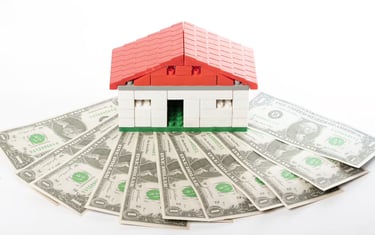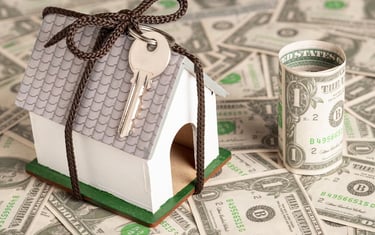
SERVICES
PURCHASE


Purchasing a home is typically the largest investment an individual will make. The prudent investor always wants an honest assessment of the true market value of what they are investing in.
Since both the sellers and realtors have a personal vested interest in the sale, having an appraisal from an unbiased appraiser assures the buyer that they will get an objective and unbiased opinion of a property's market value.
This empowers the buyer to make an informed and sound investment.
PRE-LISTING


Realtors list a home with the motivation of getting the highest price possible. However, if the home can't appraise for that price, then the price will have to be reduced, and perhaps more than once. These reductions can create a price stigma over time, which may cause the home to sell below market value.
Getting a pre-listing objective appraisal assures that a price will be set according to what the market can bear, within the length of time you wish it to sell. It also provides the seller with evidentiary support against buyer counteroffers that are too low.
FOR SALE BY OWNER


Setting the right price for a home requires both an unbiased perspective of the market appeal of the home as would be perceived by an educated buyer, and an unbiased perspective of what price the current market can bear.
Having an unbiased appraisal done first, empowers the homeowner to set a price that would be commensurate with how quickly they want to sell the home, as well as providing the homeowner with evidentiary support against buyer counteroffers that are below market value.
CASH SALE


When buying a home with cash, an appraisal is not required prior to closing. However, this leaves the buyer ill-informed as to whether a seller's subjective price is reasonable and appropriate when reconciled to the home's objective market value.
Getting an unbiased appraisal acts as a check and balance as to a home's list price. It also empowers a buyer with evidentiary support of a home's market value, which can be used as a tool in negotiating an offer.
HOME LOANS


When applying for a loan the lender determines their level of risk, in no small part, on the value of the home. Unfortunately, an appraisal is the last step in the application process. Given all the time spent preparing the application, all parties involved are left hanging their invested efforts on the outcome of the appraisal.
By getting an opinion of value first, the applicant is assured that the home’s value at the end of the process won’t be a factor as to whether or not their loan will be approved.
CONSTRUCTION LOAN


When a proposed construction requires a loan, either by a developer or a homeowner, how can its market value be determined if it doesn't yet exisit? At the request of the lender, the appraisal is developed as if the home does exist; based on the plans and specifications provided by the developer/contractor.
Once construction is completed, the appraiser is required to return to verify that all work had been completed in a professional and workmanship-like manner, and to the plans and specifications that were provided.
REVERSE MORTGAGE


For those that meet its requirements, a Reverse Mortgage affords an opportunity for a homeowner to capitalize on the equity in their home; without having to sell it. Monies are paid out either in a lump sum, as monthly payments, as a line of credit, or as a combination thereof.
In order for the lender to determine a homeowner's eligibility, as well as the amount of equity available in a home to be disbursed, an objective appraisal is required by the lender to determine the home's current market value.
PMI REMOVAL


Principal Mortgage Insurance (PMI), which is an incurred as an additional monthly charge, is typically required when the loan-to-value ratio of a home is greater than 80%. However, the longer a home is owned the less is owed on it, and hopefully, the more it's worth. This can reduce the loan-to-value ratio, thereby providing an opportunity to remove the PMI.
By ordering an appraisal, a homeowner can present to the lender evidentiary support that the home's value increased, and that PMI is no longer required.
DIVORCE SETTLEMENT


Upon a dissolution of marriage, any combined asset(s) will be divided between the two parties. Before there can be a division of any jointly owned residential properties, the value of those properties must be fairly ascertained.
By getting an appraisal, both parties are relying on an impartial and unbiased third-party appraiser to reconcile an objective, fair market value of the asset(s). This empowers both parties to come to an equitable resolution.
BANKRUPTCY


Whether applying under Chapter 7 to discharge debts, or Chapter 13 to establish a payment plan to pay off debts, having a professional appraisal is in the best interest of the debtor.
If the home value is too low, it erodes the honesty and credibility of the debtor. If the value is too high, it may remove the option of filing under Chapter 7 or result in Chapter 13 paying out more than necessary.
An unbiased appraisal reflects best on the integrity of the debtor to the court.
ESTATE/TRUST


Whether for the purposes of determining a value for a pre-listing price for resale, a charitable tax donation, an estate tax imposed; before distributing funds to its heirs, or an estate trust which allows a third party to hold assets on behalf of its beneficiaries, an impartial appraisal would be prudent.
Whether requested by an attorney or accountant, whether for a current market value, or a retroactive value as of the date of death, it is shrewd to obtain a reliable and defensible appraisal of the estate.
ASSET VALUATION


How an investor, whether it be a lender or homeowner, chooses to utilize the equity in a home depends on its value. However, markets are fluid. Supply and demand, as well as other macro and micro market influences, cause value trends to rise or fall.
With a home typically being ones greatest asset, an objective appraisal during market shifts allows the prudent investor to make an informed decision about how to balance their portfolio.
REVIEW


Appraisers adhere to legislative guidelines, and appraisal rules and standards for best appraisal practices. However, each appraisal problem is unique unto itself, and by definition an appraisal is an opinion of value. It is therefore common for different appraisers to conclude more than one opinion of value, although their values should be within a reasonable range of each other.
A review assures the appraisal meets all requirements, that its rationale is reasonable and appropriate, and that its valuation meets industry standards.
REAL FAST VALUE
REAL VALUES - REAL FAST!
Images by Freepik / Copyright 2002
RealFastValue@Gmail.com / 928-733-0070
